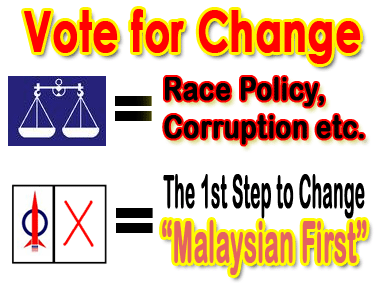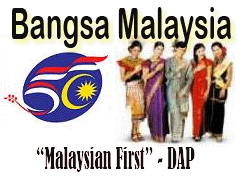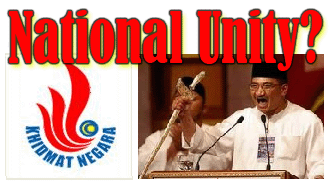Archive for category nation building
The people of Machap must vote for a change
Posted by Kit in Election, nation building on Friday, 6 April 2007

The People of Machap Must vote for a change
by Richard Teo
The Machap by-election will be an important milestone for the chinese community.It will determine, after 50 years of BN rule whether the chinese community will opt for a change or remain and continue to be marginalised by the present govt.
The choice for the people of Machap is a simple one.After 50 years where do we go from here? The present govt seem to have lost its direction and no longer have the capabilty to lead this multi-culture, multi-race and multi-religious nation where its people of different origin can live in peace and harmony.
Instead of fostering goodwill among its people the govt has implemented divisive racial policies that have polarised the different races. Its affirmative race based policy has benefited only one community and discriminated the rest.
Even its race based affirmative policy has been hijacked to benefit only a few elite UMNO members. After 50 years the Malay rural heartland of kelantan, Trengganu, Pahang, Perlis,Kedah and Johore still remain impoverished.
Corruption has creeped into every level of our daily lives. Corrupt politicians and civil servants are so prevalent that the system is powerless to act on them. Our political masters are reluctant to bring the culprits to justice because they are just as tainted with corruption. Read the rest of this entry »
“Babi” invective in Parliament – sad reflection on failure of 50 yrs of nation-building
Posted by Kit in nation building, Parliament on Wednesday, 4 April 2007
The “babi” invective by an UMNO MP in Parliament yesterday is a most sad and shocking reflection that 50 years after Merdeka, there are Umno political leaders who are still very deeply-ingrained in communal thinking and prejudices, making them poor models of a Bangsa Malaysia.
I admit that I had lost my cool when I was badgered and heckled the whole afternoon yesterday when I had sought clarifications during the Ministerial winding-up of the debate on the Royal Address.
The badgering from Barisan Nasional MPs had started when I sought clarification from the Deputy Prime Minister and Defence Minister, Datuk Seri Najib Tun Razak on integrity issues concerning the award of contracts in the national service training programme, the mega-commission scandals in defence purchases such as US$100 million for Sukhoi jets from Russia and US$120 million for submarine from France and it continued when I had sought clarification from the Deputy Internal Security Minister, Datuk Johari Baharun, whether on the serious corruption allegations which had been made against the Deputy Minister in the “freedom for sale” scandal, the most basic failure in police reform when police still refused to accept police reports or the issue of abuse of detention-without-trial powers under the Emergency Ordinance.
When BN MPs from Umno, MCA and Gerakan continued to try to drown out my attempts to seek clarification from Johari, I lost my patience and told BN MPs who did not want to listen to the clarifications which were public interest issues to “mampus” and leave the House. Read the rest of this entry »
Corruption of our history books
Posted by Kit in Education, nation building on Friday, 30 March 2007
(Thanks S.L. for the following write-up by JA)
Knowledge of our roots will benefit us
IN very recent times, the starting date for the study of Malaysian history in the schools has been conveniently fixed around 1400 C.E. It probably coincides with the founding of the Sultanate of Malacca by Parameswara.
Today, Malaysian school children only learn a little bit about the early Proto Malays and then are conveniently taken on a historical quantum leap to the founding of Malacca.
Early Indian works speak of a fantastically wealthy place called Savarnadvipa, which meant “land of gold”. This mystical place was said to lie far away, and legend holds that this was probably the most valid reason why the first Indians ventured across the Bay of Bengal and arrived in Kedah around 100 B.C.
Apart from trade, the early Indians brought a pervasive culture, with Hinduism and Buddhism sweeping through the Indo-Chinese and Malay archipelago lands bringing temples and Indian cultural traditions. The local chiefs began to refer to themselves as “rajahs” and also integrated what they considered the best of Indian governmental traditions with the existing structure.
I learnt Malayan history in the 1950s and taught it in the 1960s and 1970s in secondary schools. All the history textbooks at the time had the early Indian connection specifically mentioned in them. Teachers of that period taught about the early Indianised kingdoms of Langkasuka, Sri Vijaya and Majapahit that existed from as early as 100 C.E. Read the rest of this entry »
Tun Ismail: No Ordinary Politician
Posted by Kit in Economics, nation building on Monday, 26 March 2007
Review by Bakri Musa
Tun Ismail: No Ordinary Politician
The Reluctant Politician: Tun Dr. Ismail and His Time
Ooi Kee Beng
Institute of Southeast Asian Studies, Singapore, 2006
338 pp RM55.00
Reading Ooi Kee Beng’s biography of the late Tun Ismail is akin to eating at a buffet in a cheap Chinese restaurant. The offering was generous and you gorged yourself. However, an hour later you were hungry again; worse you could not even recall what was so special about the menu. Then it dawned on you that the food tasted good simply because you were so darn hungry.
With the present pathetic state of leadership in Malaysia, there is a yearning for the kind of leaders like the late Tun Ismail, men of
strong convictions and who did not hesitate acting on them. Ooi quoted Prime Minister Tunku Abdul Rahman who bore the wrath of Ismail’s anger over Tunku’s sudden policy change towards China. Ismail was so incensed that he tendered his resignation immediately. You would never see that kind of bravery among today’s leaders; they are more adept at toadying and ingratiating themselves.
Ooi worked hard for his book, interviewing scores of people and reviewing many documents locally and abroad. There is no shortage of quotes and anecdotes from those who knew Ismail, and Ooi added many details of Tun’s life. Therein lies the problem. The essence of the man gets buried in the avalanche of factoid overload. It does not enlighten us to know that he was awarded the National Order of Vietnam, or that he was president of the American Malaysian Society.
Ooi did not have to quote every interview. The book could do without the many “He was tough, brilliant, blunt, … ” type of general comments. They added nothing and took up valuable space.
Two interviewees, Lee Kuan Yew and Ghaffar Baba, stood out; they illuminated well Ismail’s character. Lee was expounding in his usual erudite and logical manner on a particular issue. At the end he asked Ismail what he thought about it, and the Tun simply replied, “I disagree!” Flabbergasted, Lee asked Ismail for his reasons, at which point Ismail remarked that since Lee had so brilliantly enumerated all the salient points there was nothing more for him (Ismail) to add. That reflected supreme self-confidence. By not trying to “out lawyer” the lawyerly Lee, Ismail stumped him. Read the rest of this entry »
PM – address cumulative Article 11 concerns
Posted by Kit in Human Rights, nation building, Parliament, Religion on Friday, 23 March 2007
Secondly, on Inter-religious relations today and the past 50 years. In the first two decades of nationhood, the government sponsored the establishment of a Inter-Religious Council headed by a Cabinet Minister to promote inter-religious dialogue, understanding and goodwill. Today, a very similar proposal, the Inter-Faith Council, is regarded as highly sensitive and intolerable by the government-of-the day. What has gone wrong?
It is most regrettable that despite six requests in the past nine months, the Prime Minister has refused to meet the Article 11 coalition of 11 civil society groups to uphold the Federal Constitution as the supreme law of the land — or even to give any response.
Why is the Prime Minister who preaches inter-religious dialogue in international conferences adopting such a hostile attitude to Article 11 and domestic inter-religious dialogue?
Non-Muslim concerns about religious freedom as entrenched in Article 11 have been re-ignited by the latest Court of Appeal judgment in the R. Subashini case.
Just like the S. Shamala case in 2004, the Hindu women found they could not seek legal remedy in the civil courts to protect their rights after their husbands converted to Islam and unilaterally converted their children.
Read the rest of this entry »
“Bangsa Malaysia” – has it been abandoned by Cabinet, UMNO and BN?
Posted by Kit in nation building, Parliament on Friday, 23 March 2007

It is most ironical and tragic that the government’s nation-building objectives had come under a cloud on the occasion of the nation’s 50th Merdeka anniversary — whether the Barisan Nasional government is still committed or has abandoned the objective of creating a Bangsa Malaysia.
After the denunciation of the Bangsa Malaysia concept and objective by the Johore Mentri Besar, Datuk Abdul Ghani Othman at a Umno Johore conference in early November last year – a run-up to the “fire-and-brimstone” Umno and Umno Youth general assemblies the following week — the Federal and State Governments appear to have distanced themselves from the Bangsa Malaysia objective.
Let us not forget history. The Bangsa Malaysia concept was proclaimed in Vision 2020 in 1991 with the objective that it be achieved within three decades in 2020 with the emergence of a people entirely Malaysian in perspective, transcending ethnic, religious and cultural differences
This was how Tun Dr. Mahathir Mohamad, who proclaimed Viksion 2020, explained the Bangsa Malaysia concept at the time:
This is the report from the Star (Sept. 11, 1995), which carried the front-page headline “ESCHEW ETHNICITY’, with a secondary headline of “PM: Be proud of being Malaysians”:
“Kuala Lumpur – Datuk Seri Dr. Mahathir Mohamad said Malaysians should reduce their strong sense of ethnicity in order to achieve Bangsa Malaysia.
“He said citizens should be proud of being Malaysians and work together instead of being preoccupied with ethnic origin.
“‘Bangsa Malaysia means people who are able to identify themselves with the country, speak Bahasa Malaysia and accept the Constitution,’ he said at a dialogue with the Malaysian Students Executive Council of the United Kingdom here yesterday.
“The Prime Minister said to realise the goal of Bangsa Malaysia, the people should start accepting each other as they are, regardless of race and religion.
” Dr. Mahathir said certain quarters may condemn him for wanting to achieve Bangsa Malaysia and not struggling for the Malay cause as he did during his early years in politics.
“He said when he was fighting for the Malay cause per se, he was young and his thoughts were that of an inexperienced politician. Read the rest of this entry »
National service programme and Hisham’s keris-wielding
Posted by Kit in nation building, Parliament on Friday, 23 March 2007

This year is a the 50th Merdeka Anniversary for the nation.
There are two ways to celebrate the half-century of nationhood – in a lavish expenditure of public funds in fireworks, extravaganzas and pageantry or to celebrate it in a meaningful manner to instill greater national solidarity and sense of purpose in the nation’s journey to achieve a Bangsa Malaysia and a fully developed nation status.
Parliament, as the highest political forum in the land, should set the national example to celebrate the half-century of our nationhood in a meaningful manner, with Malaysians regardless of race, religion, class or political beliefs standing up for fair, just and progressive nation-building policies to create towering Malaysians and to stop Malaysia’s loss of international competitiveness.
The most meaningful way to celebrate the country’s half-century of nationhood is to seek a national consensus as to what had gone wrong with nation-building and how we can learn from the mistakes and failures of the past decades so that we can be more successful in the next 50 years, in particular on the following issues:
Firstly, National unity — why after nearly five decades of nationhood, race relations in Malaysia is “not good, fragile and brittle”, as publicly admitted by the Prime Minister recently. Racial and religious polarization have never been more serious today than in the past five decades.
The introduction of the national service training programme in 2004 is testimony of the failure of the national education system to create national unity in the country — and this is no surprise when the Education Minister, Datuk Seri Hishamuddin Hussein is the very symbol and cause of such polarization with his racist keris-wielding histrionics at Umno general assemblies. Read the rest of this entry »
